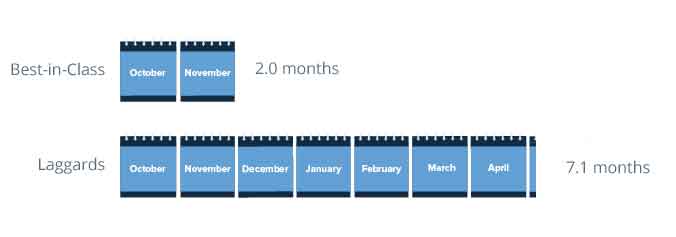
Published: 28 Feb 2019 | Author: James Beresford
What makes for BI Project Success? I read with interest the results from the BI Survey 2018 – particularly its results on the subject of Success Factors in implementing BI Applications. I took particular interest in two interlinked themes, speed and competency of implementation.
Speed is a critical part of achieving BI project success. It was very clear from the results that Enterprise BI Platforms took over 2 times as long to implement as Self Service solutions. This in itself isn’t overly surprising. An Enterprise platform is typically selected because the problem it is trying to solve is more complex. Self Service BI Solutions work excellently for targeted problem solving but in my experience struggle as the data landscape gets more complicated.
However what I thought was the most interesting finding was that the longer a program runs, the harder it is for it to deliver value. This seemed to be a universal effect regardless of project type or expected value. This led the survey takers to the conclusion – that I agree with – that smaller, more focused projects are more likely to deliver value. This is why we embrace Agile delivery methodologies at FTS Data & AI.
Tying in with speed of implementation is the competency of it. The more capable the company was in delivering BI programs, the faster they delivered – by a factor of over three times. Shorter implementations had less issues in delivery as well. This could well be a reflection of the higher competency teams delivering results more quickly and capably, resulting in better BI project success.

Implementation time by best-in-class companies in median months (credit: BARC)
The competency was also impacted by the support from vendors and implementers. Vendor support had a big impact on project outcomes, with good support correlating well with project outcomes. This works the other way as well – poor support led to worse outcomes, so tool selection criteria clearly should look at local support. I would draw again on my comments on the Australian experience with Microstrategy, where I have had customers move away from that platform due to an inability to get local support for it.
Implementers also had a significant impact – projects with excellent partner support did significantly better than those without. It is also worth noting that the wrong choice of partner can lead to outcomes that are actually worse that using no partner at all. The survey team advised picking a specialist partner over a generalist firm – which I believe ties in to the above effect of vendor support – some vendors rely heavily on partners to deliver on their behalf (e.g. Microsoft) so when choosing a partner, a strong track record with your chosen vendor platform should be a key criteria.
They also advise road testing partners with a proof of concept. I support this approach as a successful relationship with a partner needs to be evaluated and there’s nothing quite like getting hands on together to properly evaluate their competency, commitment and understanding of your specific needs.
My key takeaways from these survey results are:

Get the latest Talos Newsletter delivered directly to your inbox
Automation & Analytics Technologies for Business

Australian councils face backlogs, staff turnover, and rising community expectations. We help you improve service delivery and operational efficiency through process automation — integrated with TechnologyOne, Civica, and Pathway.

Talos helps organisations build reporting solutions using Jet Analytics

Talos helps organisations build modern data and analytics platforms using Databricks, Microsoft Fabric and Power BI. We work from strategy through implementation, ensuring you get value from the platform without unnecessary complexity.
